Stay in the know on all smart updates of your favorite topics.
“We’re not just creating technology for cities—we’re creating better cities for people.” From Global Goals to Local Action: How Amsterdam Is Building a Smarter, Fairer City
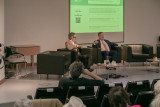
As the world grapples with massive challenges—climate change, rapid urbanisation, digital disruption, and growing inequality—some cities are not waiting for top-down solutions. They are rolling up their sleeves and experimenting with new ways to improve life for everyone, block by block. Amsterdam is one of those cities.
That’s why I was proud to share Amsterdam InChanges approach to smart, inclusive urban innovation at the #CIPPCD2025 conference in Aveiro.
Through our open innovation platform, <strong>Amsterdam InChange</strong>, the city has become a global leader in turning lofty global ambitions into practical, local action. But Amsterdam’s model isn’t built around flashy tech or utopian blueprints. Instead, it’s grounded in an essential question: How can we use innovation to improve people’s everyday lives?
Local Action for Global Challenges
Amsterdam understands that the climate crisis, digital transition, and social inequality can’t be solved by government alone—or by technology alone. That’s why it launched Amsterdam Smart City in 2009 as a public-private partnership. What began as small-scale energy-saving pilots has grown into a community of over 8,500 members, coordinating more than 300 projects across the city and beyond.
The approach is rooted in co-creation. Citizens, companies, knowledge institutions, and government actors come together to design, test, and scale solutions that serve the public good. The values that guide the network are clear: people first, openness, transparency, learning by doing, and public value.
The Doughnut as a Compass
Amsterdam was the first city in the world to embrace Doughnut Economics as a guiding framework. The “City Doughnut,” developed with economist Kate Raworth, helps policymakers balance the city’s ecological footprint with the social foundations that all citizens need: housing, education, health, equity, and more. It’s a tool to align every local decision with both planetary boundaries and human dignity.
This framework has inspired circular construction strategies, neighbourhood energy co-ops, and more inclusive procurement policies. It shows that global concepts can become real when grounded in local practice.
Making Innovation Inclusive
One of Amsterdam’s core beliefs is that smart cities must be <strong>inclusive cities</strong>. That means tackling issues like <strong>mobility poverty</strong>, where rising transport costs and digital-only services make it harder for low-income or elderly residents to get around.
Through the <strong>Mobility Poverty Challenge</strong>, Amsterdam partnered with the Province of North Holland and researchers from DRIFT to understand where and how exclusion occurs—and to design better public mobility systems. Pilot ideas like a “Mobility Wallet” (a subsidy for essential travel) and more inclusive digital apps emerged from real conversations with affected residents.
The same inclusive mindset guides Amsterdam’s digital transformation. In the suburb of Haarlemmermeer, officials flipped the script on e-government. Instead of asking citizens to become “digitally skilled,” they asked how government systems could become more <strong>humane</strong>. This led to simplified interfaces, better access to services, and ultimately more trust.
Responsible Tech and Energy from the Ground Up
Tech transparency is another pillar of the Amsterdam model. The city runs the world’s first <strong>Algorithm Register</strong>, giving the public insight into how AI and automated systems are used in services—from traffic enforcement to housing applications. Anyone can access this register, offer feedback, and better understand how digital decisions are made.
In the energy space, the city supports both bold innovation and careful upscaling. At the <strong>Johan Cruijff ArenA</strong>, used electric vehicle batteries store solar energy, powering concerts and matches with clean backup power. At the same time, a coalition of partners led by Amsterdam InChange is working to scale up Local Energy Systems by collecting lessons learned and creating a toolkit for community-led energy.
What Makes It Work?
If there’s one secret to Amsterdam’s success, it’s the governance model: small, neutral facilitation teams guiding large multi-stakeholder coalitions, anchored by public trust and shared purpose. Regular Demo Days allow project teams to showcase progress, get feedback, and adapt. This culture of transparency and iteration helps avoid the so-called “innovation graveyard,” where pilot projects go to die.
The city also embraces failure—as long as it’s shared and learned from. Reports like “Organising Smart City Projects” openly list lessons, from the importance of strong leadership to the need for viable business models and continuous user involvement.
An Invitation to Other Cities
Amsterdam’s smart city is not a blueprint—it’s a mindset. Start with your biggest local challenge. Bring the right people together. Make space for experimentation. Build bridges between local and global. And, above all, put citizens at the centre.
As international smart city ambassador Frans-Anton Vermast puts it: “We’re not just creating technology for cities—we’re creating better cities for people.”
The III International Conference on Public Policies and Data Science
Amsterdam Data Design Den- Beyond the Graph
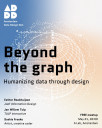
Amsterdam Data Design Den is the city's newest community meetup celebrating the intersection of data, design, and storytelling. In an era where information surrounds us, we believe in the power of creative visualization to transform complex data into compelling narratives that inspire and inform.
Every couple of months, we bring together professional designers, creative studios, and emerging talents in an informal setting to share groundbreaking projects and foster meaningful connections. Our speakers range from established design studios showcasing large-scale data visualization projects to independent designers experimenting with novel approaches to information design.
What makes our meetup unique is its commitment to accessibility and community. There's no entry fee, no membership requirements—just a gathering of curious minds passionate about using design to make sense of our data-driven world. Whether you're a seasoned information designer, a student exploring data visualization, or simply intrigued by the creative possibilities of data storytelling, you'll find your place here.
Join us for an evening of inspiration, networking, and casual conversations over drinks. Each session features thought-provoking presentations followed by open discussions, creating an environment where ideas flow freely and collaborations naturally emerge.
Amsterdam Data Design Den meets in the heart of Amsterdam, bringing together the city's vibrant creative community to explore the future of data visualization and information design.
Waag Open: Plataan-check

Er zijn allerlei manieren om luchtkwaliteit te meten, met sensoren, filters of zelfs met planten! Verken met Urgenda de mogelijkheden van natuurlijke sensoren: boomschors van platanen. Deze Waag Open vormt de aftrap van de landelijke actie van Urgenda: De plataan-check.
Platanen kunnen met hun schors veel vertellen over de hoeveelheid fijnstof in hun omgeving. In hun bast slaan ze (fijn)stof uit hun omgeving op. Onderzoekers kunnen met laboratoriumonderzoek uit de bast aflezen hoeveel fijnstof er in de omgeving van de boom is uitgestoten.
Samen met Urgenda verzamelen we tijdens Waag Open boomschors van de plataan. Daarbij vertelt Urgenda hoe plataanschors inzicht geeft in de hoeveelheid fijnstof in Nederland. Daarnaast leidt Imme Ruarus, hoofd van Waag’s Smart Citizens Lab, de avond in met een introductie over citizen sensing: hoe bewoners met technologische metingen, natuurlijke metingen en observaties hun leefomgeving in kaart brengen.
Na Waag Open kun je zelf aan de slag met plataanschors verzamelen en meedoen met de plataan-check!
🚀 Maak je bedrijf toekomstbestendig met de Circulaire Kansenkaart Noord-Holland! 🌍
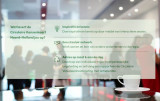
Wil jij als mkb-ondernemer concrete stappen zetten naar een circulaire bedrijfsvoering? Provincie Noord-Holland en Circulair West bieden samen met Route Circulair een GRATIS traject aan voor maximaal 10 bedrijven.
✅ Praktische tools en begeleiding
✅ Inspiratie en kennis via interactieve sessies
✅ Netwerken met andere ondernemers
✅ Persoonlijk advies en actieplan
#aanmelden? Lees verder in dit artikel: https://lnkd.in/eRA5qvAN
Innovation Dinner Digitale Fitheid

Vanuit het programma van de EDIH Digital Hub Noordwest organiseren BouwLab R&Do en 3D Makers Zone weer een Innovation Dinner.
In een wereld waar we allemaal werken met een scherm, is het belangrijk om stil te staan bij ‘hoe’ we daarmee werken. Hoe verwerken we informatie? Hoe slaan we informatie op? Hoe voorkomen we een overload aan mails en data? En hoe zorgen we ervoor dat we efficiënt blijven in een steeds digitaler landschap?
Om organisaties en hun medewerkers hierin te ondersteunen, heeft de overheid samen met verschillende partners de Maand van de Digitale Fitheid gelanceerd. Deze jaarlijkse campagne in maart richt zich op de digitale vaardigheden van de 4 miljoen keniswerkers in Nederland.
Samen met Martijn Aslander, een van de initiatiefnemers van deze campagne en auteur van onder andere ‘Ons werk is Stuk’, nemen we je mee in de wereld van digitale fitheid en de vijf essentiële pijlers:
- Digitaal bewustzijn
- Digitale Hygiëne
- Digitale vaardigheden
- Persoonlijk kennismanagement
- Persoonlijke groei met hulp van technologie
Playful Placemaking: Gamification and AI in Urban Design
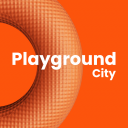
How can gamification reshape the way we design cities? 🤔
At Playground City 🛝, we’re excited to be part of <strong>Placemaking Week Europe 2024</strong>, which will take place in Rotterdam from <strong>September 24-27, 2024</strong>! 🎉
In collaboration with Studio Oa and <strong>City Makers</strong>, we’ll be hosting a session titled <strong>“Playful Placemaking: Gamification and AI in Urban Design”</strong>, under the Creating Place & Making It Last theme.
We’ll explore how gamification can improve the participatory process in placemaking, and how AI and digital tools can help us better understand and visualize changes in urban areas, using the Delfshaven area of Rotterdam as our case study 🌱🎮.
We look forward to connecting with you at the workshop, where we’ll explore how interactive, game-like elements and new technology can make urban design more inclusive, informed, and impactful.
Are you attending Placemaking Week? Let us know in the comments! We’d love to see you at our session.
Still need a ticket? Don’t wait—grab yours here: https://lnkd.in/eQQnUJVZ
Let’s create better cities together!
#Placemaking #UrbanDesign #SmartCities #CommunityEngagement #SustainableUrbanism #AIinUrbanPlanning #Gamification #RotterdamMakeItHappen #CreatingBetterCitiesTogether #PlacemakingEurope
Vacature: LCA & Circulaire Economie Specialist (Transport en Energie)
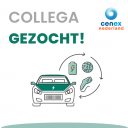
📢 Vacature Alert! 📢
Word jij onze nieuwe LCA & Circulaire Economie Specialist?
♻ 🌿 Stap in een rol waar jij direct bijdraagt aan betekenisvolle initiatieven die de toekomst van duurzame mobiliteit vormgeven!
Terwijl het gebruik van fossiele brandstoffen transformeert naar elektriciteit en waterstof, neemt ook de focus op de levenscyclusimpact en circulariteit van de waardeketens toe. Kom jij ons team versterken? Dan werk je aan baanbrekend onderzoek, analyses en strategieën rond duurzame (technologische en maatschappelijke) innovaties. Met behulp van jouw kennis, Life Cycle Assessments (LCA) en andere tools ben jij de specialist en innovator op weg naar een circulaire mobiliteitssector. Je werkt aan zowel lokale als internationale projecten, werkt samen met diverse andere specialisten en speelt een cruciale rol in deze reis.
🔍 Klaar voor deze uitdaging? Ontdek ⤵ hoe jij een verschil kunt maken!
💼 Locatie: Hybride (Amsterdam kantoor en thuiswerken)
⏰ Contract: Vast, fulltime (37 uur/week, 32 uur bespreekbaar)
💡 Sluitingsdatum: Geen specifieke datum, we zoeken de juiste match!
Klik op de link om het volledige vacaturedocument te lezen en te solliciteren. We kijken ernaar uit om van je te horen!
Data Dilemma's verslag: De Voedseltransitie
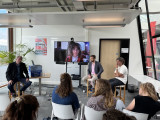
Op 30 mei nodigden we onze community uit bij AMS Institute op het Marineterrein voor een Data Dilemma’s event over de Voedseltransitie. Het ging deze middag over technische dilemma’s rond data en de verduurzaming van voedselketens, en; wat is nou echt lokaal voedsel?
Data Commons: Een digitaal gemeenschapsgoed met een gezamenlijk doel
Jan Wester, directeur van Big Data Value Center, vertelde ons meer over het project ‘Data Value Center Agri & Food Korte Keten’. Aanleiding voor dit project is de transitie naar een duurzamer voedselsysteem waarbij digitalisering en data een belangrijke rol spelen. Er is de wens dat relatief meer voeding uit de regio komt (in plaats van langere ketens), dat er meer transparantie en efficiëntie is in ketensamenwerking en dat er meer informatie wordt vastgelegd over productie en herkomst (denk aan True Pricing). Dit vraagt om een neutraal precompetitief platform. Dit platform kan je zien als een zogenaamde Data Commons: een digitaal gemeenschapsgoed waarin je samen afspraken maakt over het delen van data; wat deel je, met wie, en wat is het gezamenlijke doel ermee?
De Agrifood Data Common is een veilige data-deel omgeving/marktplaats/dashboard, met verschillende gebruikersgroepen. Ondernemers kunnen hiermee bijvoorbeeld markten transparanter maken, ketensamenwerking verbeteren en meervoudige verdienmodellen creëren. Overheden kunnen gebruik maken van de omgeving voor meer evidence-based beleid en het monitoren van impact. Ten slotte kunnen kennisinstellingen gebruik maken van het platform voor de opbouw van referentiedata en het delen van data uit experimenten en fieldlabs. Belangrijk is dat de verschillende partijen vertrouwen met- en in elkaar opbouwen om dit samen te laten werken.
De cateringketen van de Hogeschool van Amsterdam als case
DVC Agri & Food is samen met partners cases aan het bouwen die het nut en belang van dit digitale gemeenschapsgoed in de praktijk tonen. Kees Willem Rademakers van de Hogeschool van Amsterdam vertelde ons meer over het ‘Food Governance 2.0’ project met betrekking op hun eigen cateringketen.
De HvA wilt zich actiever afvragen wat ze van (hun) voedsel vinden en hoe ze een nieuwe rol kunnen spelen in hun eigen lokale voedselsysteem. Ze kijken naar factoren als gezondheid, biodiversiteit, betaalbaarheid en energiegebruik. Als je hier kritisch naar wilt kijken blijkt hoe moeilijk het is om te onderzoeken waar kantineproducten precies vandaan komen. De precieze oorsprong, de reizen die het afgelegd heeft, de arbeidsomstandigheden; het zijn onderdelen waar je als afnemer grip op- of in ieder geval een beeld van wilt hebben. Er is nu een ongelijke machtsverdeling waarbij de leverancier meer data over de keten bezit en dit gebruikt als verdienmodel.
Binnen een keten die digitaal en transparant is georganiseerd, kan de HvA zien wat er nu gebeurt, kan er onderhandeld worden, en kunnen ze samen gaan hervormen waar ze naartoe willen. Het is belangrijk om daarom de governance structuren over voedselketens en de informatiestructuren daarbinnen opnieuw vorm te geven met elkaar. Jan Wester en Kees Willem Rademakers concluderen samen dat deze hervorming vooral zit in wederkerigheid en bereidheid om meer data met elkaar te delen, en de digitale platformen die dit mogelijk maken.
Flevo Campus: Samen werken aan het stedelijk voedselsysteem van de toekomst
Lenno Munnikes vertelde ons meer over lopende initiatieven bij de Flevo Campus. Een organisatie waar onderzoek, onderwijs, ondernemerschap en overheden samenkomen om samen te werken aan het stedelijke voedselsysteem van de toekomst. Hier verbinden ze economische, maatschappelijke en kennis-vraagstukken op het gebied van een duurzame voedseleconomie en een gezonde voedselomgeving.
In een project rond ‘de supermarkt van de toekomst’ zijn ze aan het experimenteren met het verbreden van het assortiment van lokale producten in de schappen. Als je een deel van een supermarkt bijvoorbeeld reserveert voor lokale ondernemers, ontstaat er al sneller een match tussen lokale consumenten en lokale producenten. Ook wordt er gekeken hoe je stadstuinderijen kan ontwikkelen met een mix van verschillende functies. Naast voedselzekerheid, kan zo’n plek ook een belangrijke educatiefunctie vervullen voor kinderen en jongeren in de buurt, kan er onderzoek plaatsvinden, kunnen er nieuwe verdienmodellen worden uitgeprobeerd, en kan de tuin gekoppeld worden aan een zorgcentrum in de buurt.
Ten slotte vertelde Lenno over hun projecten in de zogenaamde Labs. Hier experimenteren ze op kleine schaal om ons aan het denken te zetten over ons voedselsysteem. Een bekend voorbeeld is het hergebruiken van de ‘reststromen’ van de kip. Na slachting wordt zo’n 70% van het dier als reststroom verscheept naar andere continenten. Maar wat als je nou alles van de kip verwerkt? Hoe kan je omgaan met onderdelen van een dier dat je niet opeet? Met deze vragen gingen ze aan de slag en creëerden ze bijvoorbeeld een tasje van de huid, zeep van het vet en keramiek van de botten. Een experiment als dit kan op kleine schaal worden uitgevoerd, maar via nieuwskanalen veel mensen bereiken en aan het denken zetten over ons voedselsysteem.
Onderzoek naar de klimaatimpact van een voedselketen; van verantwoording naar nieuwsgierigheid
Leen Felix, adviseur Agrifood en Biodiversiteit bij Metabolic, nam ons mee in het proces waarmee ze bedrijven adviseert over de duurzaamheid van hun voedselketen. Het begint simpel, bij de ingrediëntenlijst van een product. In plaats van de locatie van de leverancier, moet je echt op zoek naar de productielocatie; het land van herkomst per ingrediënt. De impact van voedselproductie hangt namelijk af van de combinatie van het productieproces en de productielocatie. Maten van landgebruik, bodemtransformatie en uitstoot van broeikasgassen, bijvoorbeeld, hebben ieder een effect op de natuurlijke omgeving. De ruimtelijke context bepaald hoe schadelijk deze processen zijn voor de aarde en het klimaat. Je kan hierbij denken aan de volgende voorbeelden: Het verbouwen van soja, waarbij veel land voor nodig is, is schadelijker als er regenwoud in Brazilië voor wordt gekapt. Het transformeren en homogeniseren van de bodem is schadelijker voor het klimaat, als dit gebeurt op een plek waar voorheen een relatief hoge mate van biodiversiteit aanwezig is. Water-intensieve productieprocessen hebben meer impact op mens en natuur als het plaatsvind op locaties waar water schaars is.
Metabolic koppelt daarom ruimtelijke context aan productieprocessen. Via scores is te zien hoe de negatieve impact van productieprocessen nog sterker is in ‘gebieden met een gevoeligheid’. Dit legt de complexiteit vast waar je in mondiaal voedselsysteem mee te maken hebt. Hoe meer ingrediënten in een product, hoe meer productielocaties, hoe meer factoren die de klimaatimpact beïnvloeden. Het is voor Leen als analist en adviseur de balans zoeken tussen het weergeven van álle data en de complexiteit van de keten, en het adviseren met een platgeslagen verhaal waar de opdrachtgever soms naar op zoek is. Je wilt een bedrijf niet verlammen met de data, maar ze ook wel gericht handvatten geven om bijvoorbeeld risicolocaties en ingrediënten te vermijden.
Leen sluit af met een drietal lessen voor het publiek:
- Perfecte data bestaat niet, en dat is niet eens zo erg: focus op het verhaal wat je ermee kan en wilt overbrengen.
- Van verantwoording naar nieuwsgierigheid: Je kan dus niet 100% verantwoorden en berekenen, maar je moet wel een nieuwsgierige houding tonen over bijvoorbeeld alle bijkomende milieulasten en context risico’s.
- Geen top 10 maar systeemdenken: Duurzaamheid als een simpel thema laten vallen, het is geen top 10 maar denk in systeem met contrasten, schaal, complexiteit, ruilfuncties. ‘One size fits all’ oplossingen werken niet.
Dank aan de sprekers voor hun verhalen en het publiek voor de levendige discussies na afloop. Wil je bij onze volgende Data Dilemma's zijn? De volgende editie van deze serie open events vindt plaats op 16 juli. Ook staan we altijd open voor nieuwe thema’s en onderwerpen voor deze serie; we zijn benieuwd wat voor data dilemma’s jij mee in aanraking komt bij je werk!
Amsterdamse ziekenhuizen gaan data delen
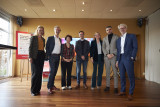
Amsterdam UMC, OLVG en het Antoni van Leeuwenhoek (AVL) gaan elkaars medische data gepseudonimiseerd hergebruiken in Health Data Space Amsterdam.
HDSA is een geheel nieuwe, regionale zorgdata-infrastructuur. Deze ondersteunt patiëntenzorg en medisch wetenschappelijk onderzoek naar gezondheid en preventie. Met als doel: gezondheidsverschillen in de regio te verkleinen en de gezondheidszorg toegankelijk te houden.
Het initiatief van de drie Amsterdamse ziekenhuizen komt voort uit een bredere samenwerking met de Universiteit van Amsterdam, Vrije Universiteit Amsterdam, Gemeente Amsterdam, Amsterdam Economic Board en Philips. Verder trekken de ziekenhuizen nauw op met Amsterdam AI, het Amsterdamse samenwerkingsverband voor kunstmatige intelligentie, en Health-RI, dat zich inzet voor een landelijke geïntegreerde gezondheidsdata-infrastructuur voor onderzoek, beleid en innovatie.
HDSA faciliteert met deze betere en snellere uitwisseling van zorgdata wetenschappelijk onderzoek naar gezondheid, beter medisch inzicht in hoe mensen langdurig gezond kunnen blijven, gepersonaliseerde preventie en behandeling van ziekten. De samenwerking is een eerste stap in de aansluiting op (een nog te bouwen) nationale infrastructuur vanuit het Integraal Zorgakkoord (IZA) en een Europese samenwerking via het European Health Data Space (EHDS).
Lees het complete bericht via
Circular Challenge: How Can We Stimulate Circular Business Models in the Electric Vehicle Charging Infrastructure Chain?
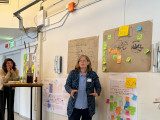
Circular initiatives often struggle to progress beyond the pilot phase, including circular charging infrastructure. Numerous barriers hinder these circular initiatives:
• Lack of data on products and how circular/sustainable they are.
• Difficulty in implementing circularity across the entire production chain.
• Regulatory obstacles.
• Current higher costs associated with circular production, leading to more expensive products.
To overcome these barriers, adjustments to regulations are necessary to better align with circular initiatives, alongside the establishment of shared ownership within the production chain.
Jonge toekomstmakers gezocht!

Wat is de impact van (platform)technologie op de overheid van de toekomst en haar rol in de (door o.a. technologie) veranderende samenleving? Wil jij de toekomst tastbaar en beeldend maken en meedoen met een groeiende beweging van jonge (t/m 35 jaar) visionairen, denkers en doeners?
Doe dan mee aan de toekomstverkenning publieke platformen georganiseerd door FUTUR en Provincie Zuid-Holland en ondersteund door Scape Agency.
Vanuit verschillende thematische invalshoeken gaan we hiermee aan de slag in groepen van ongeveer 10 jonge professionals vanuit verschillende organisaties (Publiek, privaat en kennis). Een beschrijving van de eerste thema’s vind je hieronder:
Thema's
- Circulair 2050 - De ambitie om in 2050 niet alleen klimaatneutraal, maar ook nog eens onze economie 100% circulair in te richten, vergt een omslag in denken en doen. Hoe buigen we lineaire ketens rond? Waar beginnen we? En cruciaal: welke rol speelt het publieke platform in deze transitie?
- Zicht op maatschappelijke vraagstukken met data – Data is onmisbaar voor het oplossen van maatschappelijke vraagstukken. Hoe zetten we data verantwoord in voor het benutten van deze kansen?
-Digitale Waterschappen – Bestuurt AI in 2050 het waterbeheer, of wordt water juist lokaal beheert?
-Ambtenaar van de toekomst – Als steeds meer taken worden overgenomen door (platform)technologie, wat is dan de rol van de ambtenaar van de toekomst en welke vaardigheden worden gevraagd?
- Participatie – hoe kan de overheid betrokkenheid van inwoners, bedrijven en maatschappelijke organisaties vormgeven bij beleid en besluitvorming?
- Uitvoering van de toekomst – De meeste publieke dienstverleners leveren een stand van de uitvoering aan. Hoe moet de uitvoering en publieke dienstverlening van de toekomst worden vormgegeven?
- Online leefwereld van jongeren – Welke publieke waarden moeten vooropstaan op social media, hoe ziet een dergelijk platform eruit en welke digitale vaardigheden van jongeren zijn cruciaal?
- Tomorrows Governance – hoe verandert de rol, organisatie en wijze van samenwerken van de overheid?
- Mobiliteit en Brede Welvaart - Wat is de impact van (platform)technologie op de bijdrage van mobiliteit aan de brede welvaart van mensen door de bereikbaarheid van banen, voorzieningen en sociale contacten in de stad, en de regio?
- Sociaal Domein – Hoe kan platformtechnologie bijdragen aan de complexe problemen in het sociaal domein? Hoe ga je toe naar een overheid die er voor de inwoner is, in plaats van de inwoner van het kastje naar de muur stuurt.
- Ethiek
Zijn een van die thema's iets voor jou? Meld je dan aan via: https://kennislab.typeform.com/to/MRNbvgIl
Wat betekent meedoen?
- Je sluit je aan bij een themagroep. En doet mee in de voorbereiding, dus het verzamelen van voorbeeldcases uit eigen werk, rapporten, studies, literatuur, films enz.
- Je doet op 13 februari mee met de visiedag (09:00 - 13:00), en bij voorkeur ook de aansluitende verbeeldingsdialoog in het Provinciehuis van de Provincie Zuid-Holland in den haag. Op deze dag werken de themagroepen met ondersteuning van ontwerpers en kunstenaars hun toekomstbeeld uit.
Je bent in maart beschikbaar voor 1 digitale of fysieke sessie voor de verdere uitwerking van het toekomstbeeld.
- Je bent op 4 april aanwezig (vermoedelijk enkel de middag) bij het slotevent ‘publieke platformen’ georganiseerd door de provincie Zuid-Holland in het provinciehuis. Op 4 april ‘exposeren’ de groepen hun toekomstbeeld aan een breder publiek, en wordt er op verschillende manier een dialoog georganiseerd tussen bezoekers, experts en bestuurders.
- Je vergroot je netwerk, je doet inspiratie op voor de vraagstukken waar jij dagelijks mee bezig bent en je hebt vooral plezier.
Join our team! Circular Economy and LCA Team lead
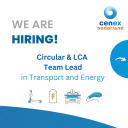
Are you an experienced professional in Circular Economy and Life Cycle Assessments and eager to lead a team of experts in zero-emission mobility and energy infrastructure? If so, we have the perfect opportunity for you!
WHO WE ARE
Cenex Nederland is a not-for-profit research organisation and consultancy specializing on zero emission mobility, energy infrastructure and circular economy. Our mission is to support our customers and partners in making the world a better place to live and travel.
We are a compact but rapidly growing team with complementary expertise. We foster a work environment that is supportive, encouraging self- initiative, and promoting independence. Join our fun and professional team where sustainability and innovation are considered 'business as usual'!
Following the motto 'Alone we can do so little; together we can do so much' we collaborate with governments and industry parties helping then achieve their zero emission transport goals.
Amsterdam may be our hometown, but our activities and ambitious agenda have an international reach. We frequently engage in European or international projects working together with other professionals.
YOUR ROLE
The world of e-mobility is evolving rapidly. Not only are battery and hydrogen electric vehicles becoming an integral part to the transport and energy landscape, but the focus on their lifecycle impact and circular economy within the industry’s value chain is also gaining significant traction. Should you join us, you will be leading a small team of Life Cycle Assessment (LCA) experts and will be contributing in various research and consultancy assignments. Your daily activities would include:
• Leading a growing team of circular economy and LCA experts, offering guidance and support
• Managing EU-fundedR&D projects in the field of transport and renewables
• Conducting research, modelling and analysis of environmental, social and economic lifecycle impacts of products within the transport and energy industries.
• Leading the development of eco-design tools, circular economy roadmaps and policy frameworks to support public or private organisations in achieving their circularity goals.
• Writing project proposals and engaging with prospect clients.
• Reviewing and writing scientific and public-facing reports
• Presenting at conferences, organising training sessions and workshops
YOUR PROFILE
The role of Circular Economy & LCA Team Lead within Cenex NL encompasses a variety of specialisms. We are seeking a new colleague who meets the following requirements:
Essential
• A minimum of five years in roles related to circular economy consultancy and/or research, or other relevant experience.
• Relevant Master’s degree (such as Industrial Ecology, Industrial Design, Engineering, Environmental Sciences).
• Demonstrated project management experience and ability to responsibly manage multiple projects.
• Experienced in using LCA software to quantify environmental, social and economic impact.
• Strong affinity/experience with mobility, transport, and energy sectors and related technologies
• Ability to deliver value and quality to our customers and partners (verbally and written)
• Self-starter and completer of assignments
• Willing and able to travel (inter)nationally with some regularity
• Already living in the Netherlands with an existing work-permit to work in NL Fluent in English, written and spoken
Desirable
• Experience in people management
• Experience with (EU) funding programmes (such as Horizon Europe)
• Dutch (at minimum A2 level) and/or additional languages
• Driving licence
CONTACT DETAILS
Do you see a good match? Send us your <strong>CV and motivation letter</strong> to hello@cenexgroup.nl We look forward to hearing from you!
Research project - Shifting circular: urban infrastructure and policy changes towards renewed territorial metabolisms
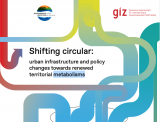
Find out this comparative analysis of critical policies and infrastructures essential for advancing the urban circular transition!
This piece of work draws upon the insights garnered from the experiences of four European cities, including Amsterdam. Reflecting on pivotal levers and obstacles pivotal in catalyzing socio-ecological transformations towards alternative urban metabolisms forms the crux of this exploration. This insightful report, commissioned by the Deutsche Gesellschaft für Internationale Zusammenarbeit (GIZ), the German agency for international cooperation, has been recently unveiled within the Circular Economy Solutions Dialogue (CESD) under the auspices of the Think20 (T20) working group focused on sustainable urbanization.
As a PhD researcher, I am now embarked on another research project on circular policies and strategies. One of my fieldwork is based in Amsterdam, spanning from January to April 2024. I am enthusiastic about establishing connections and potentially collaborating during my stay in the city!
Aan de slag met Digitale Transformatie: Data & AI Seminar

Wil je optimaal profiteren van data?
Ben jij volop bezig met datagedreven projecten? Wil je leren hoe je het maximale uit data kunt halen en hoe je de uitdagingen kunt tackelen? Dan mag je ons Data en AI Seminar op 30 januari absoluut niet missen. Dit event gaat verder dan enkel inspiratie; het biedt je concreet praktische tools om data effectief in te zetten. Onze experts delen waardevolle inzichten, best practices en direct toepasbare tips om jouw organisatie te laten excelleren in de datagedreven wereld.
Voor wie is dit event?
Ben jij de drijvende kracht achter digitale transformatie in jouw organisatie? Sta je voor grote veranderingen en zoek je praktische tools die direct inzetbaar zijn? Ons seminar op 30 januari 2024 is speciaal ontworpen voor managers en besluitvormers die willen excelleren in de wereld van AI, analytics en data. Ontdek hoe je deze krachten kunt inzetten voor een tastbare impact in jouw organisatie. Ook professionals die hun kennis willen vergroten op deze baanbrekende onderwerpen zijn van harte welkom. We bieden inzichten en praktische tools die jou een voorsprong geven.
Wat kun je verwachten?
Vier inspirerende sprekers nemen je mee in het succes van datagedreven werken. Ze delen waardevolle inzichten en praktische tips om je op weg te helpen. Dit evenement biedt ook uitstekende mogelijkheden om te netwerken en ervaringen uit te wisselen.
Programma en locatie
Het programma is samengesteld uit een openingssessie en drie sprekerssessies.
Natuurlijk sluiten we de dag gezamelijk af met een hapje en drankje.
Datum: 30 januari 2024
Locatie: Royal HaskoningDHV, Amersfoort (Laan 1914 35, 3818 EX)
Minecraft Almere Pampus Challenge: pushing the boundaries to build the city of the future

In today's dynamic landscape, the key to success lies in collaboration. The Green Innovation Hub firmly believe in the power of partnerships between companies, government and educational institutions to drive innovation, growth and positive change. In a world where technology connects us in unique ways, the Minecraft Almere Pampus Challenge exemplified the power of communities coming together to achieve remarkable feats.
It's inspiring to witness the incredible work of our young talents. They are the architects of the future and they're currently building virtual cities where companies can find their next digital solutions. Whether you represent a company, government department, or educational institution, we invite you to connect and explore how we can collaborate to make a meaningful impact on our shared goals.
1. Fresh Perspectives: young talent brings fresh and innovative perspectives to the table. They're unafraid to challenge the status quo and reimagine how things can be done.
2. Cutting-Edge Tech: these virtual cities are powered by the latest technologies from Microsoft and Iamprogrez. Companies can tap into this tech-savvy generation to incorporate cutting-edge solutions into their operations.
3. Collaboration Opportunities: collaborating with these digital pioneers can lead to mutually beneficial partnerships. Your company can gain a competitive edge while offering mentorship and growth opportunities to the next generation.
Find the Green Innovation Hub (NL Pavilion) at the Smart City Expo World Congres in Barcelona, and let's meet each other. Together, we'll keep pushing the boundaries of what's possible in the Minecraft universe and to build the house – or even the city of the future. Also stay tuned for upcoming advantures, events and challenges on our channels.
Watch the video: https://youtu.be/4F7CFGfb2HE
🍃 Join us for the next gathering of Climate Tech Amsterdam on October 17 at TNW City.

<strong>🍃 Join us for the next gathering of Climate Tech Amsterdam on October 17 at TNW City.</strong>
An initiative backed by leading ecosystem players, including TNW, StartupAmsterdam, Carbon Equity, Google Netherlands and supported by Climate Tech Cities and De Roos
💡 For this edition, we'll uncover the latest trends & developments in (Dutch) Climate Tech and facilitate discussions around e.g. Sustainable AI and Closing the Climate Finance Gap.
Climate Tech Amsterdam is the Netherlands’ leading community of climate tech innovators, experts and enthusiasts gathering during meetups, roundtables and events to exchange best practices, discuss challenges and opportunities and showcase success stories within Climate Tech.
Spots are limited, so make sure to register!
Vote your favourite innovative idea to the AmSIA stage!
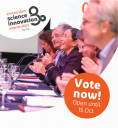
Which innovative idea will make it to the stage during the finale of the Amsterdam Science & Innovation Award 2023? This Innovation Award is the Amsterdam competition for research based innovative ideas that contribute to a better world. Check out the website and watch the pre-finalists one-minute videos in which they present their innovative ideas and vote for your favorite! During the finale on 21 November, the jury will award € 10,000 to the three best ideas in the categories of Society, Health and Environment & Climate.
Exploring the Future of Data in the Circular Economy: Highlights from Data Dilemma’s!
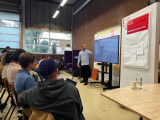
Amsterdam, a city with an ambitious goal of becoming fully circular by 2050, envisions a future where materials are continuously reused, waste is minimized, and resource cycles are closed. Achieving this vision hinges on the availability and analysis of data, which allows us to assess the extent to which materials are used, reused, or wasted. However, this data is often elusive, complex to analyse, and, in some cases, not even recorded. These challenges surrounding circular data were the focal point of our recent event, "Data Dilemma's: Collecting Data for the Circular Economy."
During Data Dilemma's, we explore the possibilities for using data and new technologies to address urban and societal challenges, with a focus on responsible digitalization. The goal is to use data to make cities more safe, clean and accessible. But what happens to all the data that is collected? Which dilemmas do we encounter when we collect (personal) data to improve the city.
Apparently, the topic of this edition of Data Dilemma’s was not only of interest to the Amsterdam Smart City team, since this event was completely sold out. This was no surprise, with the three incredible speakers we had lined up: Mersiha Tepic (municipality of Amsterdam), Maarten Sukel (Picnic), and Joris Bouwens (Metabolic).
Mersiha Tepic: Circular Economy Monitor Amsterdam
Mersiha Tepic, Senior Researcher at the Research & Statistics department of the Municipality of Amsterdam, demonstrated the Circular Economy Monitor Amsterdam. This essential tool tracks Amsterdam's progress towards a circular economy and identifies areas requiring further attention.
The monitor gives interesting insights. For instance, it shows that the environmental impact of food is four times as big as the impact of the built environment, even though the amount of materials used in the built environment is four and a half times larger than for food.
It reveals that food has a very high environmental per kilogram compared to materials from the built environment. This is interesting because it makes the total environmental impact of food much higher than the impact of the built environment, even though the built environment uses four times as much mass in materials than food.
For more information on the circular monitor and all its insights, you can check out their (Dutch) website.
During her presentation, Mersiha also delved into the data dilemma she faces in this project—the scarcity of data from significant commercial entities operating within the city. The lack of data from these key players poses a considerable challenge to Amsterdam's circular ambitions, and Mersiha's work sheds light on the importance of bridging these data gaps.
Maarten Sukel: Data-Driven Precision at Picnic
Our second speaker, Maarten Sukel, a Data Scientist at Picnic Technologies, showcased how the online supermarket Picnic leverages data. He presented an innovative approach that combines traditional data sources with images, written descriptions, and geographical information to predict customer preferences accurately. By doing so, Picnic not only optimizes its supply chain but also minimizes waste, aligning with the circular economy's core principles.
Maarten's insights provided a glimpse into how data-driven precision can be a game-changer in the pursuit of sustainability and waste reduction, and he also gave a convincing sales pitch on why you should be a customer of Picnic.
Joris Bouwens: The Promise of Digital Product Passports
Closing the event was Joris Bouwens, a Project Manager and Senior Consultant at Metabolic's Circular Industries team. Joris shed light on Digital Product Passports and their potential to revolutionize the circular economy. These passports offer a comprehensive digital record of a product's lifecycle and environmental impact, empowering consumers to make informed choices and encouraging responsible consumption and recycling.
Joris's presentation highlighted the immense opportunity presented by Digital Product Passports in getting as much value from used products as possible. To fully illustrate the potential of Digital Product Passport, Metabolic has created a visualization of the data flows in four sectors: Electronics, Chemicals, Apparel, and Construction. You can find these visualizations here.
We extend our gratitude to our amazing speakers for their invaluable contributions and to our engaged audience for their active participation in the discussion.
In the next edition of Data Dilemma’s we will delve into the fascinating world of the underground. What cables, tubes, and other assets can be found there, how is the data on these assets shared, and how can we improve collaboration? We hope to see you there on the 26th of October.
Do you have any suggestions for which Data Dillema's we should uncover next? Let us know in the comments below.
AI & The City

Join us on 28 September to explore how (generative) AI will impact our cities and change the way we live, work & play.
From livability to sustainability, from health/wellbeing to public safety, from transportation to infrastructure, and from economic opportunities to urban planning: there are many opportunities ahead (and already happening).
From ethical implications to regulation, from awareness to safety/trust, and from data quality to technological infrastructure: we also got plenty of challenges to address and overcome.
Like to join this virtual roundtable session on 28 September? Visit http://sharingcitiesalliance.com/events to sign up (for free).
We welcome you to already share your ideas, cases as well as concerns regarding (generative) AI via LinkedIn.
AI & The City is an initiative of the Sharing Cities Alliance & Studio Sentience.
Stagiair social media voor Amsterdam Donut Coalitie
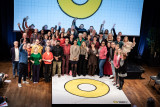
Ben jij gepassioneerd over A) de donuteconomie B) Amsterdam en C) heb je communicatie & sociale media skills? Dan zijn we op zoek naar jou en jij naar ons! De Amsterdam Donut Coalitie is namelijk op zoek naar een gedreven social media stagiair. Of je nu de voorkeur geeft aan een deeltijd- of voltijds stage, wij staan open voor beide opties. Bovendien bieden wij een maandelijkse vergoeding van 400 euro voor voltijd!
Dit is jouw kans om hands-on ervaring op te doen en direct impact te maken. Je zult in contact komen met pioniers en betrokken raken bij tal van inspirerende projecten en activiteiten in Amsterdam. Bovendien word je onderdeel van een ervaren team dat je begeleidt bij o.a. branding en vormgeving. Als kers op de taart krijg je de kans om bij te dragen aan het Donut Festival en internationale samenwerkingen!
Jouw verantwoordelijkheden omvatten onder andere:
- Het beheren van de contentkalender
- Twee keer per week posts plaatsen op LinkedIn en Instagram
- Het verzorgen van een maandelijkse nieuwsbrief
- Het verder ontwikkelen van onze LinkedIn- en Instagram-kanalen
- Het publiceren van nieuwsitems op onze website
- Het uitwerken van een promotiestrategie voor het jaarlijkse Donut Festival
We waarderen jouw eigen ideeën en inbreng en staan altijd open voor jouw suggesties!
Ben je geïnteresseerd? Stuur dan snel een e-mail naar Rosa Tibosch: connect@amsterdamdonutcoalitie.nl met een korte motivatie en je cv.
#AmsterdamDonutCoalitie #DonutEconomie #DonutAmsterdam #AmsterdamDonut #DoughnutEconomics #DoughnutEconomy #DEAL #Stage #Stagiair #Intern #SocialMedia
Stay up to date
Get notified about new updates, opportunities or events that match your interests.

